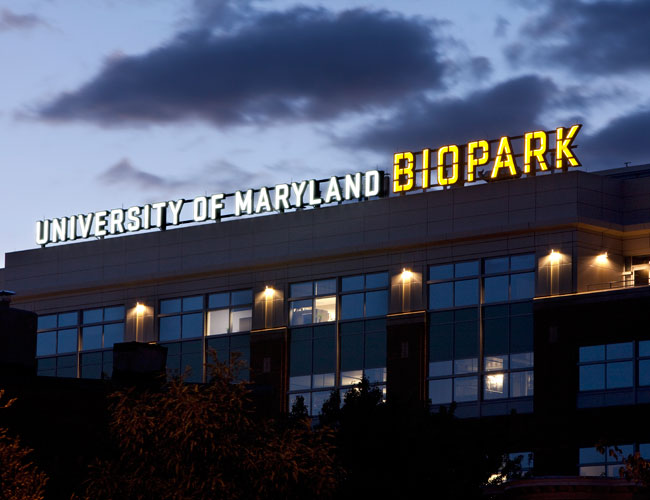A biotechnology company developing a synthetic blood product that could be used in trauma settings is joining the community at Baltimore’s University of Maryland BioPark.
KaloCyte, which is relocating from St. Louis, will become an affiliate member of the BioPark, the company said in a news release on Monday.
The company is developing a red blood cell substitute, called ErythroMer, which is designed to capture and release oxygen like a normal red blood cell. The company said it could be used in both civilian and military settings.
“A key feature of our bio-inspired artificial red blood cell is that it can be freeze-dried, making it easy to store and transport,” KaloCyte CEO Elaine Haynes said in a statement. “Once reconstituted, the artificial red cells can potentially be used at the scene of injury, on prehospital transport vehicles, and to supplement hospital blood supplies during complex procedures or periods of high demand.”
The move comes as the company’s cofounders are joining the faculty at the University of Maryland.
At the Baltimore-based University of Maryland School of Medicine, KaloCyte cofounder and Chief Scientific Officer Dr. Allan Doctor is directing the recently-formed Center for Blood Oxygen Transport & Hemostasis (CBOTH).
KaloCyte Chief Technology Officer and Cofounder Dr. Dipanjan Pan is also joining CBOTH as director of its nanobiofabrication core, and is joining both the University of Maryland School of Medicine and UMBC as a professor. Dr. Pan is a chemist and bioengineer credited with being behind the invention of the company’s product.
Along with cofounder Dr. Philip C. Spinella, the pair demonstrated proof-of-concept for ErythroMer at Washington University School of Medicine in St. Louis. In Baltimore, the company is looking to move toward human trials, which could begin in the next two to three years.
The company is backed by $6 million in funding via investors and federal grants. It has two full-time employees, and is expecting to grow to five employees by the end of 2019.
Along with the universities, the company said it will also be closer to federal partners including the National Heart, Lung, and Blood Institute’s Small Business Program and the U.S. Department of Defense Army Combat Casualty Care Research Program.
“We welcome KaloCyte as a BioPark affiliate as the company is another important healthcare startup joining the University of Maryland’s and Baltimore’s vibrant biotechnology community. We appreciate the value the KaloCyte team is bringing to innovations in healthcare and the contributions the founders will make to the University,” James Hughes, chief Eeonomic development officer and vice president at University of Maryland, Baltimore, said in a statement.
The move by KaloCyte follows news this summer that genomics leader Illumina is opening a new center at the BioPark. The university is also planning a new, 10-story building at the corner of W. Baltimore St. and Martin Luther King, Jr. Blvd.
Before you go...
Please consider supporting Technical.ly to keep our independent journalism strong. Unlike most business-focused media outlets, we don’t have a paywall. Instead, we count on your personal and organizational support.
Join our growing Slack community
Join 5,000 tech professionals and entrepreneurs in our community Slack today!

The person charged in the UnitedHealthcare CEO shooting had a ton of tech connections

From rejection to innovation: How I built a tool to beat AI hiring algorithms at their own game

Where are the country’s most vibrant tech and startup communities?


